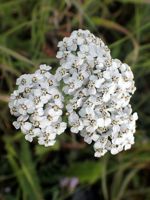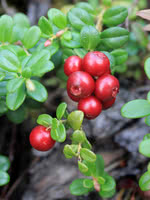Mon-Fri 9am - 5pm Mountain time
Bog Cranberry (Lingonberry) vs Yarrow
Achillea borealis (Previously Achillea millefolium)
Vaccinium vitis-idaea
SOLD OUT
NOT AVAILABLE THIS SEASON - MIGHT RETURN
Yarrow is a herbaceous, native wildflower that is found across Canada. It features large, flat clusters of tiny white flowers. The blooms attract a variety of pollinators, making it an ideal choice for pollinator gardens. While partial shade is tolerated, the best flowering occurs in full sun. Yarrow is resistant to deer and rabbits, making it both a beautiful and practical addition to your landscape.
The entire plant is edible, but leaves and flowers are most commonly consumed. They have a strong licorice scent and a mild sweet flavor that is similar to tarragon. Yarrow leaves can also be used as a natural insect repellent.
It is important to plant Yarrow in the right place, it can spread quickly via both rhizomes and self-seeding. Deadheading the spent flowers will extend the bloom season and can help limit self-seeding.
Bog Cranberry is a native, ground cover species. These plants generally produce one crop per year in summer. Plants may spread 3 feet in width forming a dense mat which makes it attractive as an ornamental ground cover.
Wild crops of Bog Cranberry are harvested each year in Newfoundland (more than 200,000 lbs/yr). Harvest of wild fruit can no longer keep up with demand. In Europe, 80 million pounds per year of this crop is grown or harvested from the wild.
Bog Cranberry flowers are similar in shape to those of blueberry and may be white or pink in color. These berries are considered to be highly flavored but not as tart as cranberries.
Check out our YouTube video of this plant in the fall: Fall Bog Cranberry.
Note: We use Bog Cranberry for Vaccinium vitis-idaea. This species is also known by many other common names. Please confirm the scientific name to ensure you are ordering the correct plant.
Yarrow Quick Facts
Bog Cranberry (Lingonberry) Quick Facts
Toxicity: toxic to dogs, cats, and horses

